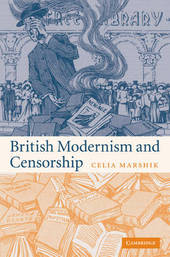
|
British Modernism and Censorship
Paperback / softback
Main Details
| Title |
British Modernism and Censorship
|
| Authors and Contributors |
By (author) Celia Marshik
|
| Physical Properties |
| Format:Paperback / softback | | Pages:272 | | Dimensions(mm): Height 229,Width 152 |
|
| Category/Genre | Literary studies - from c 1900 - |
|---|
| ISBN/Barcode |
9780521101288
|
| Classifications | Dewey:820.911209041 |
|---|
| Audience | | Professional & Vocational | |
|---|
| Illustrations |
Worked examples or Exercises; 6 Halftones, unspecified
|
|
Publishing Details |
| Publisher |
Cambridge University Press
|
| Imprint |
Cambridge University Press
|
| Publication Date |
12 February 2009 |
| Publication Country |
United Kingdom
|
Description
Government censorship had a profound impact on the development of canonical modernism and on the public images of modernist writers. Celia Marshik argues that censorship can benefit as well as harm writers and the works they create in response to it. She weaves together histories of official and unofficial censorship, of individual writers and their relationships to such censorship and of British modernism. Throughout, Marshik draws on an extraordinary range of evidence, including the files of government agencies and social purity organisations. She analyses how works were written, revised, published and performed in relation to this complex web of social forces. Chapters of Dante Gabriel Rossetti, Bernard Shaw, Virginia Woolf, James Joyce and Jean Rhys demonstrate that by both reacting against and complying with the forces of repression, writers reaped personal and stylistic benefits for themselves and for society at large.
Author Biography
Celia Marshik is Assistant Professor of English at the State University of New York, Stony Brook.
Reviews"Brilliant and thoroughly grounded in archival material and historical context, this book is essential reading for scholars of Victorian and Modernist literature. Marshik's study is unquestionably a landmark contribution British literary studies and offers a new perspective that no previous book-length scholarly work has addressed." -Vara Neverow, Southern Connecticut State University, Woolf Studies Annual
|